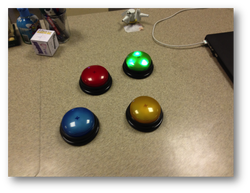
One member of each group was then nominated to compete in a quick-fire question round against other groups at the front of the class. The first person to hit the buzzer and answer the question correctly gained two points, an incorrect answer looses 1 point. After 7 questions the "contestant" was changed so all members of the group were involved.
This exercise proved to be really effective and the students became hugely competitive insisting that comprehensive explanations to the answers had to be given in order to gain the points. The students soon realised that making the questions as difficult as possible meant that their team could answer the question as the wrote it, but other groups may not be able to.
All the buzzers make different sounds which I bought the from an internet auction site. A range are available from farm animal sounds to ones which light up. The minimum needed is 5 as it enables more smaller groups to be formed so all students get to be the contestant.


 RSS Feed
RSS Feed
